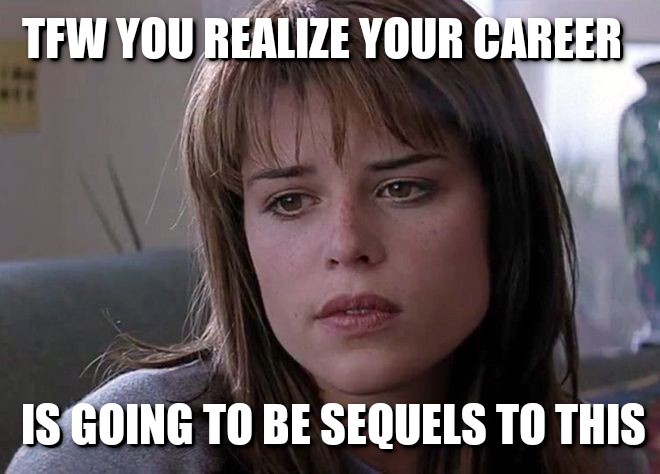
On the anniversary of her mother’s murder, Sidney receives a threatening phone call from an anonymous tormentor. Soon after, she’s attacked by a man in an off-the-shelf Halloween costume. The assailant carefully covers his tracks by leaving misleading clues that cast everyone Sidney knows as a suspect, at least until they too are picked off. Meanwhile, a local reporter believes she can exonerate the man convicted of killing Sidney’s mom if she can get the scoop on the real killer who appears to be back to finish what he started.
I spent 23 years avoiding this film. Director Wes Craven was once an undeniable master of horror. And here he was making a “self aware” feature about the formulas the horror genre sticks to. But this is also late-era Craven, who had descended into schlocky horror that seemed to rise to merely underwhelming at best. However, Scream is the movie that also that put him back in the spotlight and revitalized his career. He would spend the rest of his life making sequels to this movie between forgettable duds. The movie developed a fanbase, and spawned a MTV television series that actually got a second season.
Where most horror before this movie features a bevy of Hollywood hopefuls with short resumes, Scream featured an A-list cast of bankable stars with still fresh faces. If the high-gloss, clean-gore, horror-lite teen star vehicles of the late 90s through the 00s bother you, Scream is where they formula was born. And let’s not forget the stunt casting of the mega-star Drew Barrymore only to kill her off before the opening credits.
Scream is an ode to the 90s. And it’s very much stuck there. Almost every aspect of this film is polished slick, putting style above substance. Lead actress Neve Campbell is passable as Sidney Prescott, but the camera spends far much time mooning over her doleful expressions instead of connecting the audience to her grief. Every supporting character is well coifed, with Skeet Ulrich playing a rip-off of Johnny Depp’s character from Craven’s A Nightmare on Elm Street and Matthew Lillard playing Matthew Lillard in anything.

The score work also stands out for failing to match the on screen action. Score work, done well, will set the mood the director wants the audience to feel. But the score work here, while not bad as a composition itself, is a wailing Brian Eno knock-off that carries only one mood: nap time. But forget dozing off because the score blares at 11 throughout, frequently drowning out the on-screen dialog. This slow wail carries through every emotional scene and, oddly, ever action scene as well. The only reprieve we get is from the occasional dated pop soundtrack.
The the movie (and the franchise, actually) makes extensive use of Nick Cave’s 1994 single “Red Right Hand.” By the time of Scream, this song had already featured prominently in other culturally significant works such as Dumb and Dumber and the soundtrack to The X-Files along with others, making it a bit overplayed then and even more so now. Round out the soundtrack with other recognizable 90s staples like Moby and Republica and the entire film comes across like a long play 90s video specifically targeted to the era’s tween demographic.
